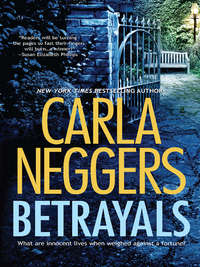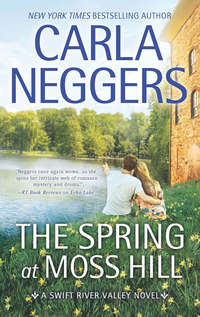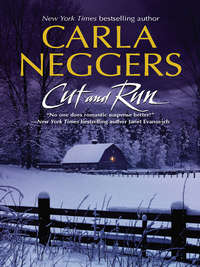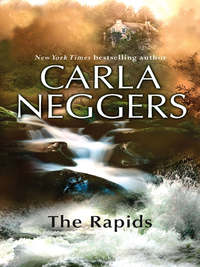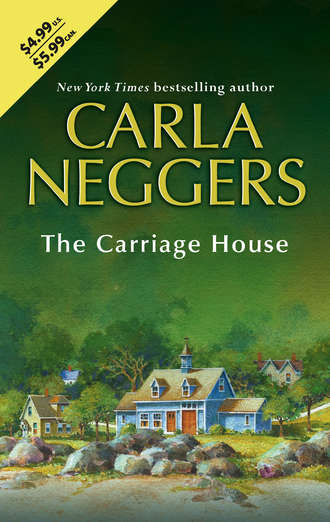
Полная версия
The Carriage House

Praise for the novels of
CARLA NEGGERS
“No one does romantic suspense better!”
—New York Times bestselling author Janet Evanovich
“Neggers’s brisk pacing and colorful characterizations sweep the reader toward a dramatic and ultimately satisfying denouement.”
—Publishers Weekly on The Cabin
“These pages don’t just turn; they spin with the best of them.”
—BookPage on The Waterfall
“Suspense, romance and the rocky Maine coast—what more can a reader ask for? The Harbor has it all. Carla Neggers writes a story so vivid you can smell the salt air and feel the mist on your skin.”
—New York Times bestselling author Tess Gerritsen
“Tension-filled story line that grips the audience from start to finish.”
—Midwest Book Review on The Waterfall
“Carla Neggers is one of the most distinctive, talented writers of our genre.”
—New York Times bestselling author Debbie Macomber
“A well-defined, well-told story combines with well-written characters to make this an exciting read. Readers will enjoy it from beginning to end.”
—Romantic Times BOOKclub on The Waterfall
CARLA NEGGERS
The Carriage House

To Robyn Carr
Contents
Chapter One
Chapter Two
Chapter Three
Chapter Four
Chapter Five
Chapter Six
Chapter Seven
Chapter Eight
Chapter Nine
Chapter Ten
Chapter Eleven
Chapter Twelve
Chapter Thirteen
Chapter Fourteen
Chapter Fifteen
Chapter Sixteen
Chapter Seventeen
Chapter Eighteen
Chapter Nineteen
Chapter Twenty
Chapter Twenty-One
Chapter Twenty-Two
Chapter Twenty-Three
Chapter Twenty-Four
Chapter Twenty-Five
Chapter Twenty-Six
One
On the day Ike Grantham disappeared, he missed an appointment with Tess Haviland, a Boston graphic designer and one of the few women who didn’t find him irresistible. She liked him, but over a year later, she still couldn’t explain why. He was blond, handsome, a risk-taker, outgoing to a fault, egalitarian and very determined not to fit the stereo-type of the serious, philanthropic-minded heir to a New England industrial fortune. He was without guilt or ambition, and there were days Tess thought he was without morals, too. Especially where women were concerned.
Except for her. “Tess,” he used to say, “you have too many men with guns in your life. I’m steering clear.”
She had no men with guns in her life. It just seemed that way because she’d grown up in a working-class neighborhood and her father owned a pub. Ike wasn’t without stereotypes of his own.
He was on her mind not just because it had been over a year since he’d taken off without a word, but because she’d just received the real estate tax bill for the carriage house he’d given her in lieu of a check. It was an 1868 carriage house on a small lot practically across the street from the ocean, within walking distance of one of the prettiest villages on the North Shore. The structure itself wasn’t much. The location was. This was reflected in the property’s value—and in her tax bill.
Tess stared down at the Old Granary Burial Ground four floors beneath her Beacon Street office. Thin, old tombstones tilted in different directions, and tourists crept along the paths in the lush shade, the tall trees filled out with leaves now, the long hard Boston winter finally over.
It had been a nose-to-the-grindstone winter. She’d left a secure corporate job to go out on her own early last year, just before Ike had bowed out of her life as abruptly as he’d barged in. Sometimes she wondered if he’d infected her—not romantically, but in creating a sense of urgency in her, so that the “someday” she’d go out on her own became something she had to do now. She’d been doing work for his Beacon Historic Project on the side, and before she knew it, she was hanging out her shingle. She’d worked out of her apartment for the first six months. Then, last fall, she and Susanna Galway decided to rent an office together in a late-nineteenth-century building on Beacon Street, a prestigious address. They had one room on the fourth floor, overlooking the city’s most famous cemetery.
Tess turned from the window and looked at her friend. Susanna was tall and willowy, as dark as Tess was fair, with porcelain skin and eyes as green as the springtime grass down in Old Granary. She was also a financial planner, and Tess had only just told her about the carriage house. Susanna was at her desk, Tess’s tax bill laid out on her keyboard. Occasionally she’d emit a sigh that conveyed the utmost distress.
“This is why you’re an artist,” she said finally. “Damn, Tess. You always get paid in cash. It’s Rule One. If I’d been around to advise the Indians, do you think I’d have let them take beads for Manhattan? Hell, no.”
“I can sell it.”
“Who would buy it? It’s run-down. It’s on the flipping historic register. It’s on a minuscule lot. And, I might add—” She swiveled around in her expensive ergonomic chair, zeroing in on her office mate and friend with those piercing green eyes. “I might add that the place is haunted.”
“That’s just a rumor.”
“And not haunted by Casper the Friendly Ghost. Your ghost is a convicted murderer.”
Tess dropped into her own chair at her computer. She did a great deal of her work, but not all, by computer. She still had an easel, oil pastels, drawing pencils, watercolors. She liked to touch and feel what she created, not just see it on a computer screen. Her screen was blank now, her computer in sleep mode. Her U-shaped work area, stacked and overflowing with samples, files, invoices, work in progress, wasn’t as tidy and uncluttered as Susanna’s. They were yin and yang, she liked to tell her more artistic friends. That was why they could work in the same space without killing each other.
“It was a duel,” Tess said. “It’s just that it happened to take place in the carriage house. Benjamin Morse challenged Jedidiah Thorne to a duel after Jedidiah accused him of abusing his wife, Adelaide. Jedidiah killed him and went to prison because it just so happened that dueling was illegal in Massachusetts. If Benjamin had killed Jedidiah instead, he’d have gone to prison.”
“You’re splitting hairs. It was murder.”
Whatever it was, it happened in the carriage house within a few weeks of its completion. Jedidiah Thorne never got to live in the estate he’d built in Beacon-by-the-Sea. The Thornes had been seamen on the North Shore for centuries, but he was the first to make any money, prospering in shipping in those first years following the Civil War. After serving five years in prison for killing Benjamin Morse, Jedidiah headed west, only to return, finally, to the East Coast just before his death. It was his ghost people said haunted the carriage house to this day. It was where he’d killed a man—it was where his spirit remained. Why, no one seemed to know.
“I don’t believe in ghosts,” Tess said. Susanna rocked back in her chair. She was dressed in smart, slim pants and a shirt-top, naturally graceful, her nails done, her makeup perfect. She’d left San Antonio for Boston late last summer, moving herself and her twin daughters in with her grandmother in Tess’s old neighborhood. There was an ex-, or soon-to-beex-, husband back in Texas. Susanna didn’t like talking about him.
“Let’s put it this way,” she said. “You’re stuck. Pay the tax bill or let the town take the place and call it a day. Or try to sell it. New Englanders are pretty damn weird when it comes to old houses. Maybe someone’ll buy it.”
“I’m not sure I want to sell it.”
“Tess! You’ve had this place for over a year and haven’t stepped foot in it.”
“That’s because I kept thinking Ike would show up and want it back, or want more work for it, or his sister would. Lauren Montague is the workhorse for the Beacon Historic Project—I’m not sure Ike told her what he was up to.”
“He could transfer the deed on his own?”
“Apparently. I did promise him I’d do more work—we were to discuss specifics the day he stood me up. I haven’t heard from him since.”
“Think he’s dead?”
Tess winced at Susanna’s frank question and jumped back to her feet, staring once more at the centuries-old tombstones below. There were more people buried there than had markers. Her throat was tight as she thought about Ike. He was in his mid-forties, so filled with life and energy it was impossible to believe he was dead. Yet, that was what most people assumed—that his recklessness had caught up with him and he’d gone overboard or walked off a cliff. Not on purpose. Ike would never commit suicide.
“Taking off for months at a time without telling anyone is within his pattern of behavior,” Tess said. “The police haven’t declared him a missing person or anything. I don’t know if Lauren has sounded the alarm.” She glanced over at Susanna. “It’s not something I’ve pursued.”
“Well, dead or alive, he signed the place over to you. I assume your accountant factored it into your last year’s income taxes, and now obviously the property tax assessors have caught up with you. So, that cinches it. You can’t avoid reality. The carriage house is yours. What you do with it is up to you.”
“I’ve wanted a place in Beacon-by-the-Sea for as long as I can remember,” Tess said quietly, watching two kids about twelve years old reading Sam Adams’s tombstone. John Hancock was buried in Old Granary, too, as well as Benjamin Franklin’s parents, the victims of the Boston Massacre, Mother Goose. “My mother and father and I used to have picnics there on the beach before she died. We’d walk past all the old houses, and Mum would tell me stories. She loved American history.”
Susanna came and stood beside her. “Fundamentally, all financial decisions are emotional.” She gave Tess a quick, irreverent grin. “Look at it this way—a run-down nineteenth-century carriage house haunted by a convicted murderer ought to make an interesting weekend project.”
Tess decided to drive up to Beacon-by-the-Sea and take a look at her property that afternoon. She quit work early to get ahead of rush-hour traffic and made her way up Route One, then along the water to a quiet stretch of rockbound coast on the tip of Cape Ann. The May sun sparkled on the Atlantic, bringing back memories of driving this way when she was six, up front with her father, her mother tucked under blankets in back, telling stories of whales and lost ships until she either fell asleep or became unintelligible, making sense only to herself.
After Ike Grantham had stood her up, Tess had come to Beacon-by-the-Sea three or four times hunting for him, but to no avail. His own sister didn’t seem to be worried about him. Why should Tess be? Ike had taken off without notice before, often. He was self-centered and inconsiderate, not because he meant to be but simply because he was.
Now she was on her way to the Beacon Historic Project’s offices to pick up the key to the carriage house. The offices were located in one of its restored late-eighteenth-century buildings in the village, just a short walk to the harbor. Modeled after the more famous Doris Duke Foundation in Newport, Rhode Island, the project—Ike’s brainchild—bought up old houses and outbuildings all over the North Shore, gutted them, rebuilt them according to exacting standards and leased them to carefully screened tenants. In many once-decaying neighborhoods, the project’s work had sparked renovation and renewal, a sense of civic pride. When she started freelancing for Ike, Tess had toyed with the idea of leasing a small early-eighteenth-century house herself. Then he’d presented her with the carriage house. Its 1868 construction put it outside the project’s parameters—they preferred pre-1850 structures. Or so Ike had explained. Tess had never really understood what his motives were.
She entered the building that housed the project’s offices, a pretty herbal wreath on its saffron-painted front door. Inside, the atmosphere was sedate and elegant, more like entering a home than offices. The rooms were decorated in period colors and pieces, and through a doorway to the right, a pencil-thin older woman greeted Tess in an affected nasal voice. “May I help you?”
“Hi, Mrs. Cookson.” Tess smiled, walking onto the thick carpet. “I’m Tess Haviland—”
“Why, Miss Haviland, I’m so sorry. I didn’t recognize you. What can I do for you?”
“I stopped by to pick up the key to the Thorne carriage house. I know it’s been a while, but I thought I should take a look at it before I decide what to do.” Muriel Cookson looked confused, and Tess added quickly, “Ike told me you’d have the key here.”
“The key to the Thorne carriage house? I don’t understand—”
“It’s all right.” Lauren Grantham Montague approached from an adjoining room, smiling graciously. Her resemblance to Ike was subtle, but unmistakable. “It’s so good to see you, Tess. I should have called you myself long before now. Mrs. Cookson, I have the key to the carriage house. I’ll get it for Tess.”
“Is Miss Haviland doing work for us?”
Lauren continued to smile, but a coolness had come into her gray eyes, as if she was struggling to hide much stronger emotions. “No, I assume she’s checking on her property. Isn’t that right, Tess?”
Tess nodded. “I need to make some decisions.”
At Lauren’s side, Muriel Cookson was obviously confused. Lauren said briskly, “Before he left last year, Ike transferred ownership of the Thorne carriage house to Tess. I should have told you before now. It simply hasn’t come up.”
The elderly receptionist paled, but said nothing. She was a contrast to the tawny-haired Lauren and her expensive, tasteful clothes and easy manner. There was nothing naturally gracious or easy about Muriel Cookson, whom Ike used to describe to Tess in unflattering terms, taking the sting only partly out when he’d declare the project couldn’t run without her. That the Beacon Historic Project interested him at all amazed Tess. Then again, Ike Grantham was a fixer-upper in his own way. It wasn’t so much that he liked to help people for their sake as he believed totally in his ability to know what they needed. As arrogant and self-centered as he was, he had a charm, an energy about him, that inspired people. His enthusiasm for life and risk was contagious.
“Muriel wants to die at her desk, in her Rock-ports,” he would tell Tess, “but Lauren wants Visionary Philanthropist written on her tombstone.”
He’d said this sarcastically, the same day his younger sister had announced her engagement to Richard Montague, a domestic terrorism expert with the North Atlantic Strategic Studies Institute. Ike’s ego knew no bounds. When he took off a week later, Tess half assumed he was miffed because he hadn’t gotten to handpick his future brother-in-law and needed to nurse the wound to his ego. Lauren was totally dedicated to the Beacon Historic Project, wanting to take it in new directions. Ike didn’t care. Tess had sensed he was bored with it, anxious to move on—and apparently he had. Lauren and Richard were married two months later, without Ike.
Lauren withdrew into the adjoining room at the back of the old, restored house. Tess waited in awkward silence with Muriel Cookson, who wouldn’t like not knowing Ike had given away one of the project’s properties, even if he’d done them a favor in dumping the carriage house. They’d bought it five years ago and, Ike had said, hadn’t drawn up even the most preliminary plans of what to do with it. It had been one of his whims, he’d told Tess. A mistake he wanted to correct by transferring ownership to her.
Lauren returned, handing Tess a manila envelope. “There are two keys, both to the side door. There’s no front-door key, I’m afraid, and no bulkhead key.”
“Thank you.”
“My pleasure. Let us know if there’s anything we can do. We have a number of files on the carriage house’s history in our archives upstairs.”
Tess could feel the outline of the keys through the envelope. Her keys. Her carriage house. She was surprised at the sudden rush of excitement. If Ike came back tonight and said it was all a mistake, what would she do? She thanked Lauren, said goodbye to her and Mrs. Cookson and withdrew into the May sunshine. A cute shop across the street had a display of painted furniture in the window. Next to it was a chocolate store. Down the street, she could see boats in the harbor, bright buoys bobbing on the light surf. She breathed in the smell of the ocean and smiled. For the past year, she hadn’t dared believe the carriage house was really hers. It had to be a mistake, never mind the papers she and Ike had signed. Maybe they weren’t legitimate, wouldn’t hold up in court if Lauren decided to contest the transfer. After all, Tess had promised Ike more work. As week after week went by without word from him, as she poured every minute, every dime she had, into her one-woman graphic design business, she had found herself completely paralyzed over what to do about the carriage house.
No more. At least not for the moment. She hopped into her car and headed out of the village along the ocean. The business district ended, houses thinned out. A rock-strewn beach stretched out on the ocean side of the road as it wound onto a narrow point. At the very tip of the point was the Thorne estate, a slate-blue clapboard house with gnarled apple trees, oaks and a huge shagbark hickory holding their own against the elements. The main road hooked around in front of it, intersecting with a narrow side street where the carriage house stood. Tess slowed, barely breathing, and made the turn.
The carriage house was exactly as she remembered it from last March, its narrow clapboards also painted a slate blue, its own gnarled apple tree out front. She pulled into its short, gravel driveway. Well, she thought as she stared at the small house, maybe it was a little more run-down than she remembered.
And in early spring, the lilacs weren’t in bloom. They were now, the bushes growing in a thick, impenetrable border on the back and both sides of the carriage house’s small lot, carving it out from the rest of Jedidiah Thorne’s original estate. She could smell the lilacs through her open windows, their sweet scent mingling with the saltiness of the ocean.
She shut her eyes. “All right, so the place is haunted. What do you care? With your imagination, you’d probably invent a ghost on your own. This way, you don’t have to.”
But leave it to Ike Grantham to give her a haunted house—and her to take it.
Two
Andrew Thorne was not a happy man. He tried to convey this to Harley Beckett, his cousin and the one man on the planet Andrew would trust with his life—if he didn’t kill him first.
“She’s not in her tree house.”
Harl grunted. “Then she’s chasing after that damn cat.”
He was flat on his back under a 1920s rolltop desk he was working on. Harl was the best furniture restorer on the North Shore, maybe in all of New England. His skills as chief Dolly-watcher, however, were currently under suspicion. Dolly was Andrew’s six-year-old daughter, and when he’d come home from work—a long, aggravating day of things not going his way—he’d found her gone. And Harl oblivious.
Harl scooted out from under the rolltop and sat up on the spotless pine floor of the outbuilding where he lived and worked. He was particular. One stray dog hair or speck of mud, he maintained, could ruin a project, a touch of hyperbole few would dare point out to him. He was a Vietnam combat veteran and a retired police detective, and he’d never taken pains to make friends in Beacon-by-the-Sea. Neither had Andrew, but he got along with people better than Harl did. Which wasn’t saying a lot.
Harl pulled his white ponytail from inside his habitual POW-MIA shirt. He had a white beard, shrapnel scars, parts of two fingers missing and a manner that was gruff on his best days. He studied Andrew for half a second, then sighed. “She’s supposed to stay in the yard. She knows that.”
“She won’t have gone far,” Andrew said with conviction, ignoring the twist of incipient panic in his gut. He hated not knowing where his daughter was.
Harl got stiffly to his feet. “Let’s go. Hell, Andrew. Time I realize she can do something, she’s off and done it. She never used to leave the yard without asking.” He shook his head, plainly disgusted with himself. “I told her to stay in the yard not five minutes ago. I swear to God.”
“You go out front,” Andrew said. “I’ll check back here.”
“We don’t find her in five minutes, we call in a search party.”
Andrew glanced at the ocean across the street, and his stomach clamped down. He nodded, and the two of them set off.
Her neighbors, whoever they were, actually owned the lilac hedge. Tess recalled Ike explaining that to her. She reached out a palm and let a drooping cluster of blossoms brush against her skin. They were at peak, the tight, dark purple buds opening into tiny lavender blossoms, spilling their fragrance. Surely she could pick a bouquet. The hedge was obviously neglected, the lilacs in need of pruning and thinning. A few weedy saplings even grew in their midst.
“Here, kitty, kitty. Come, kitty.”
A little girl’s voice rose from the middle of the lilacs, just to Tess’s left. It was high-pitched and cajoling, and a moment later, its owner pushed through to the narrow strip of overgrown grass on the carriage house side of the lilacs. She couldn’t have been more than six, a sturdy girl with coppery braids, freckles and blue eyes that were squinted as she frowned, hands on hips. She hadn’t yet seen Tess. “Come on, Tippy Tail.” She stamped a foot, frustrated and impatient now. “I won’t bother you! I’m your friend.”
Tess noticed something in the girl’s hair and realized it was an elaborate jeweled crown. She also wore denim overalls and a Red Sox T-shirt. Tess still had on her clothes from work, a suit that suggested creativity but also professionalism. She didn’t want to look too artsy and end up scaring off the kind of clients she needed in order to stay in business.
The girl turned and saw Tess, but she seemed neither surprised nor curious. She was obviously a girl with a mission. “Have you seen my cat?”
“No, I haven’t. Actually, I just got here myself.” Tess hadn’t dealt with many six-year-olds. “Is someone with you? Where’s your mother?”
“She’s in heaven.” The girl’s tone was matter-of-fact, as if she were giving the time. Tess pushed a hand through her hair. Lately, she’d been fretting about too much work, Ike Grantham and his carriage house and not enough about the rest of her life. She was thirty-four, and while she wasn’t sure about children she’d had damn rotten luck with men of late. “Where do you live?” she asked.
“Over there.” The girl pointed through the lilacs. “Harl’s watching me.”
Not very well, Tess thought. “Harl’s your baby-sitter?”
“Yep.”
“My name’s Tess. What’s yours?”
“Princess Dolly.” She gave her coppery braids a regal little toss.
“Princess? Really?”
“Yep.”
Tess relaxed slightly. A six-year-old who thought she was a princess was something she could relate to. “How did you come to be a princess?”
“Harl says I was born a princess.”
Whoever this Harl was, Tess wondered about his judgment when it came to kids. But what did she know? She glanced at her yard with its strip of overgrown grass. Lots of places a cat could hide. “I take it you lost your cat?”
Reminded of her mission, Princess Dolly raised her shoulders and let them fall in an exaggerated, dramatic shrug. “Yes. That Tippy Tail. She’s having kittens any day. Harl says I should leave her alone.”






